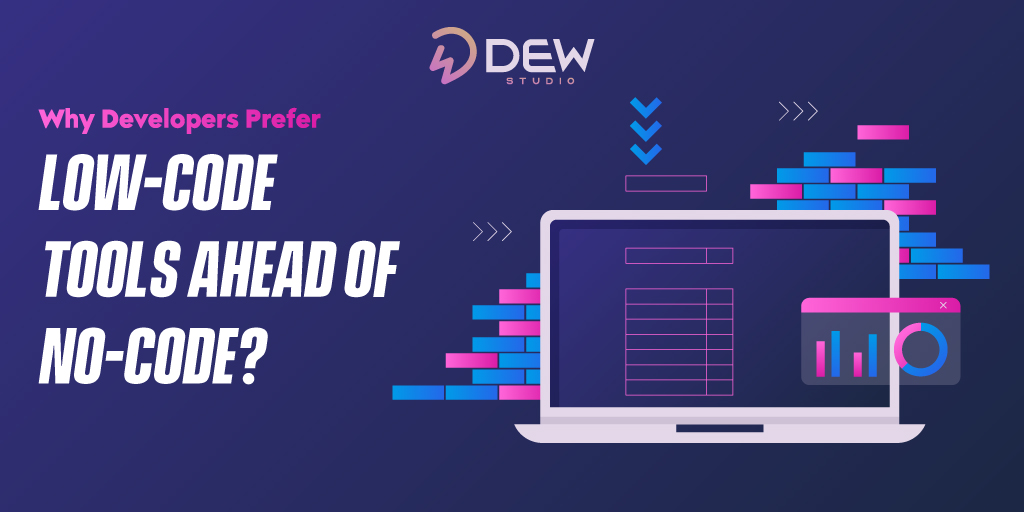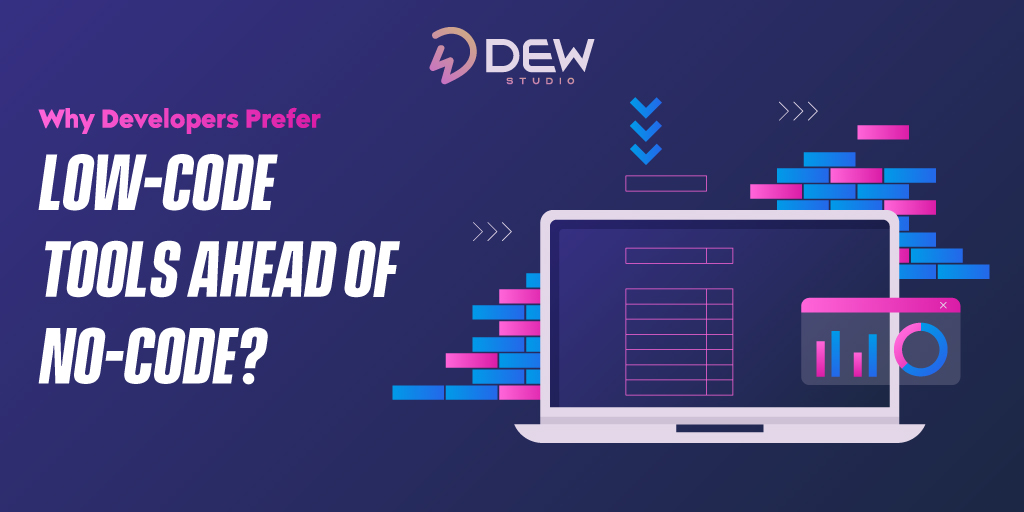
In software development, a shift is occurring. Developers now have a growing preference for Low-Code tools over no-code counterparts. This transition is not without reason. Low-code development platforms offer a unique set of advantages that resonate with professionals seeking efficient, flexible, and scalable solutions to meet the demands of contemporary software development.
In this article, we’ll look at the rationale behind this trend, exploring the benefits of low-code software and why developers are making this pivotal choice.
Decoding the Choice: Low-Code Tools vs. No-Code Solutions
Let’s explore the manifold low-code benefits that reveal an innovative approach to software development.
The Ease of Low-Code Development
- Inspiring Developers: Low-code tools provide developers with a platform where they can exercise their expertise and creativity. Unlike no-code solutions that often come with limitations, low-code platforms allow developers to scratch into the code when needed, giving them the freedom to create custom solutions while still enjoying the benefits of accelerated development.
- Flexibility in Customization: Developers cherish the ability to customize their applications to meet the specific requirements of their projects. Low-code app development platforms allow for intricate tailoring, enabling the creation of complex and highly specialized applications without constraints.
Speeding Up Development
- Agile Development: One of the primary reasons developers gravitate towards low-code tools is the agility they offer. Low-code development streamlines the process, reducing time spent on coding and testing, which, in turn, accelerates time-to-market. Developers can respond swiftly to changing project demands, aligning with the agile development methodology.
- Reducing Repetition: Low-code platforms come equipped with pre-built templates and components, saving developers from reinventing the wheel. By eliminating repetitive tasks, developers can focus on innovative solutions, making the most of their skills.
Maintaining Code Quality
- Code Control: Low-code platforms do not compromise on the quality of the code. Developers have the autonomy to intervene in the generated code, ensuring that it aligns with their organization’s coding standards and best practices. This ensures that the end product maintains high quality and is reliable.
- Error Identification and Correction: Low-code tools provide mechanisms for easy identification and correction of errors. Developers can quickly identify issues within the code and address them effectively, minimizing bugs and enhancing the user experience.
Scalability and Complex Projects
- Handling Complex Projects: While no-code platforms are suitable for simple applications, Low-Code App Development Platform is the preferred choice for more complex projects. Low-code platforms make it easier for developers to build sophisticated, large-scale applications that require advanced functionalities and integrations.
- Scalability: Low-code app development platforms are inherently scalable, making them the ideal choice for projects that need to grow with the business. Developers have the flexibility to incorporate new features and functionalities as the project progresses, ensuring long-term viability.
Security and Compliance
- Security Features: Low-code platforms come with failsafe security capabilities, addressing the concerns of developers and organizations. This ensures that applications developed with low-code tools are secure and compliant with industry standards and regulations.
- Control Over Security: Developers have control over security measures, giving them the ability to implement specific security protocols and tailor them to the project’s needs, thereby mitigating vulnerabilities.
According to Gartner’s latest report, low-code platforms have experienced exponential growth in the last few years.
DEW Studio is among the top low-code platforms in the market. It seamlessly combines efficiency, code quality, and innovation, making it the tool of choice for developers who want to create exceptional applications. In an industry where every second counts and innovation is key, DEW, Developer Efficiency Wizard, is the gateway to taking your development to the next level.
Conclusion: The Developer’s Choice
The shift towards Low-Code Solutions is driven by the desire for efficiency, control, and flexibility. Developers are empowered by these platforms, which allow them to exercise their expertise and craft high-quality, customized solutions.
Low-Code vs No-Code tools, while accelerating development, do not compromise on code quality, making them the preferred choice for complex and scalable projects. Security and compliance are also addressed, providing peace of mind. In an industry where innovation and speed are paramount, it’s clear that developers prefer Low-Code Platforms as their trusted companions in the ever-evolving world of software development.
Have questions or need guidance on low-code development? Reach out to our DEW Studio team of experts today. Contact Us!


